Party General Secretary To Lam has written an article emphasizing the power of solidarity to drive the country into the new era of development.
The following is a translation of the article.
THE POWER OF SOLIDARITY
To Lam
General Secretary of the Communist Party of Vietnam Central Committee
“Unity, unity, great unity – Success, success, great success.” This immortal saying by President Ho Chi Minh, delivered in the mid-20th century, remains profoundly relevant to this day. The strength of solidarity is not only a lesson distilled from millennia of human experience, but also the very foundation upon which the great achievements of civilization have been built. This holds especially true in the case of Vietnam’s revolutionary history over the past century. In the current period, as the whole nation is vigorously pursuing the policy of streamlining the organizational apparatus of the political system, merging administrative units, and essentially “reordering the nation’s landscape” to ensure sustainable development, the spirit of solidarity must be harnessed more powerfully than ever. With the Party’s strategic vision and leadership mettle, we are determined to uphold and promote the strength of great national unity, viewing it as a “lifeblood”, a “red thread” running through all undertakings, ensuring that every policy and orientation of the Party and State is thoroughly, consistently and effectively implemented, in full service of the people’s legitimate aspirations.
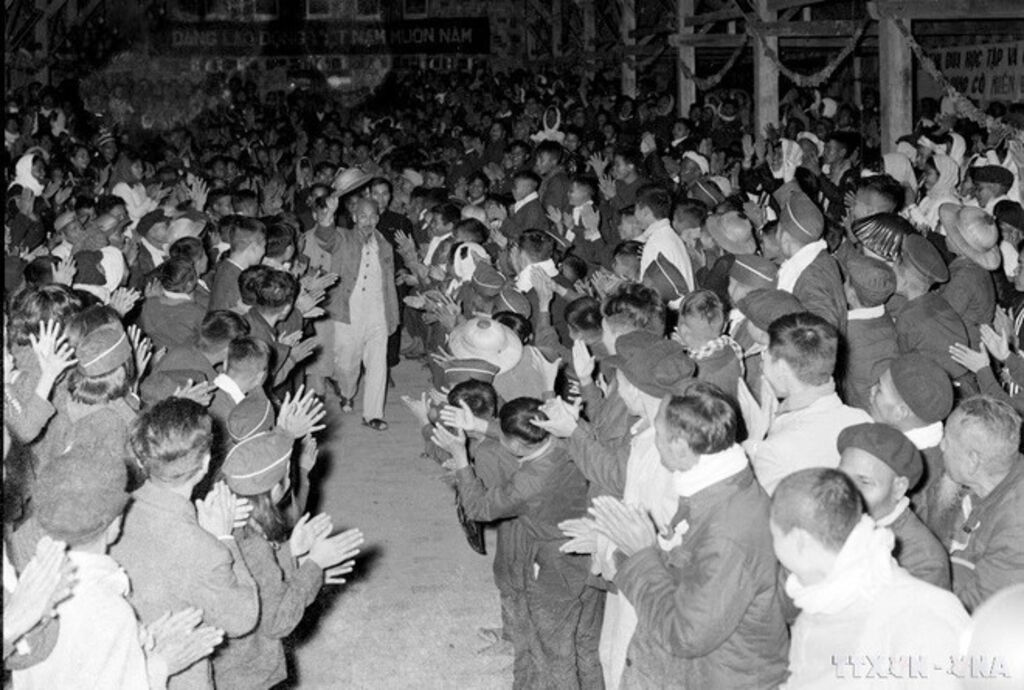 |
| On the occasion of the Lunar New Year 1956, President Ho Chi Minh visits students of the Ethnic Minority Cadre School__Photo: VNA |
Solidarity – A timeless truth
From the dawn of humankind, community spirit and solidarity have been essential to the survival and advancement of human society. Our forefathers captured this in a proverb: “One tree alone cannot make a hill; three trees together form a high mountain.” The power of a collective is always greater than the sum of individual efforts; “a bundle of chopsticks” is far stronger than “a single pair”. When people unite, work together and share a common purpose, their strength grows exponentially, enabling them to overcome any adversity and danger. History across the world has shown that tightly knit communities can triumph over both natural disasters and human conflict, while disunity inevitably leads to decline. It is for this reason that the message “solidarity is strength” has become a universal truth, passed down through all forms of social organization for thousands of years.
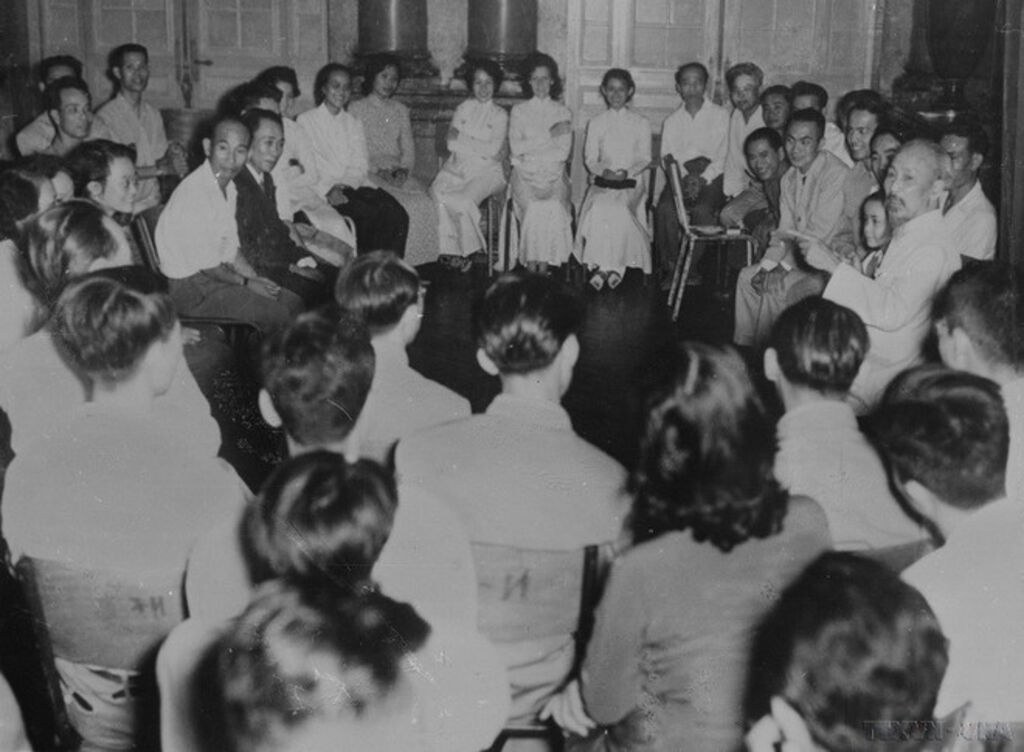 |
| President Ho Chi Minh meets with overseas Vietnamese in France who return to participate in national construction in October 1956__Photo: VNA |
In Vietnam’s long history of nation-building and defense, the spirit of solidarity has been even more pronounced and has become a treasured tradition. From the early days of Van Lang and Au Lac, through the Dinh, Le, Ly and Tran dynasties, and to the modern era, the strength of great national unity has always been highly valued. A thriving society and a strong, enduring nation have been made possible by the power of unity. Nguyen Trai once observed: "The people can propel the boat, but they can also capsize it," “Only when the boat capsizes does one realize the power of the people is like water," “Generals and soldiers bound together in filial loyalty/ Mingling river water with sweet rice wine.” These historical lessons are deeply rooted in the thinking of our ancestors: “Without the people's support, even the easiest task will not succeed; with the people's support, impossible tasks can be accomplished.” When the people’s will aligns with that of the leadership, no foreign force can subdue our nation.
In particular, since the Communist Party of Vietnam (CPV) assumed leadership, the tradition of great national unity has been elevated to new heights. President Ho Chi Minh was a brilliant inheritor of the national ethos of “the people are the root”, and creatively applied Marxism–Leninism to build an alliance among workers, peasants and intellectuals and a broad-based national united front. He affirmed that “Solidarity is our strength. If we are firmly united, we will surely be able to overcome all difficulties, capitalize on every advantage, and fulfil all tasks entrusted to us by the people.” The history of the Vietnamese revolution has fully borne out this truth: When our people stand united as one, our nation is independent and free; when we are divided, we are vulnerable to invasion. From the August Revolution in 1945 to the Dien Bien Phu Victory in 1954, from the Great Spring Victory in 1975 to today, every glorious milestone has been the crystallization of the strength of great national unity, fueled by passionate patriotism and the will to “rather sacrifice everything than lose our country, than live as salves”. It was the people’s strength, the unity and shared resolve of millions of patriotic Vietnamese, that enabled us to make a miracle - defeating some of the most powerful empires of the 20th century. The fortune, potential, stature and international prestige we enjoy today are due in large part to the power of great national unity.
Conversely, history shows no shortage of bitter lessons on the consequences of disunity leading to failure. The anti-colonial struggle in the late 19th century failed, in part, due to the absence of nationwide unity. Numerous valiant uprisings were ultimately crushed because of the lack of coordination and solidarity among leaders and forces of the time. The lesson that “division leads to downfall” remains clear: even a single internal conflict or rift can weaken collective strength and create openings for adversaries to exploit through divide-and-rule tactics. The collapse of certain political parties and regimes around the world further demonstrates that when unity within a party or society breaks down, and when group interests or narrow-minded ideologies eclipse the common cause, failure becomes almost inevitable. On the contrary, tight-knit unity is an “invincible force” that empowers a nation to overcome all challenges and achieve glorious victories.
From the successes and setbacks of history, one can draw a fundamental truth: unity is a matter of survival and is decisive in determining the success of any revolution. It is through unity that we have transformed danger into stability and defeated every scheme of division and sabotage. Conversely, even partial disunity can erode power and dismantle the hard-won achievements of the revolution. Therefore, building and safeguarding unity must remain a top priority for any genuine revolutionary organization.
Unity as a strategic principle of the Party
From its very inception, the CPV has remained steadfast in its commitment to the strategy of great national unity, viewing it as both a fundamental objective and a critical source of strength to secure revolutionary victories. The Party has always recognized internal unity as a vital principle in Party building efforts. Throughout the revolutionary process, the Party has issued numerous resolutions and directives aimed at consolidating and promoting the strength of solidarity. As early as 1943, the Party introduced the Outline of Vietnamese Culture, which highlighted three guiding principles for cultural mobilization, one of which was “massification,” emphasizing that all activities must serve the public interest and attract the broadest participation from the people. On February 3, 1969, President Ho Chi Minh, in his article "Enhance Revolutionary Ethics, Eradicate Individualism", warned against factionalism and parochialism, describing them as enemies of unity that must be decisively eliminated. Before his passing, in his Testament (1969), he earnestly urged the Party to preserve its unity as one would protect the pupil of their eye. Heeding his words, the Party has regarded internal unity as an indispensable principle and top requirement in its Party-building mission. The true strength of a nation lies in the unity and coherence between the administration and the people. The Party has issued thematic resolutions focused on harnessing the power of national unity. For example, Resolution No. 23-NQ/TW adopted at the seventh Plenum of the ninth Party Central Committee in 2003 was the first to set the task of “promoting the great national unity for a prosperous people, a strong nation, and a just, democratic and civilized society.” Twenty years later, at the 8th Plenum of the 13th Party Central Committee (2023), the Party continued this strategic direction with Resolution No. 43-NQ/TW on strengthening the tradition and power of great national unity in the new era. Resolution 43 reaffirms that national solidarity is a treasured tradition and a consistent strategic guideline of the Party; it is a tremendous source of strength and a decisive factor in all victories in the cause of national building and safeguarding. The resolution also emphasizes that unity within the Party is the nucleus for fostering unity across the entire political system and broader society. Internal cohesion within the Party, from the Central Committee to grassroots levels, must be marked by genuine unity in thought and action. Each Party member must prioritize the collective interest above all, strictly observe Party discipline, and resolutely prevent all forms of factionalism or group interests that could undermine unity.
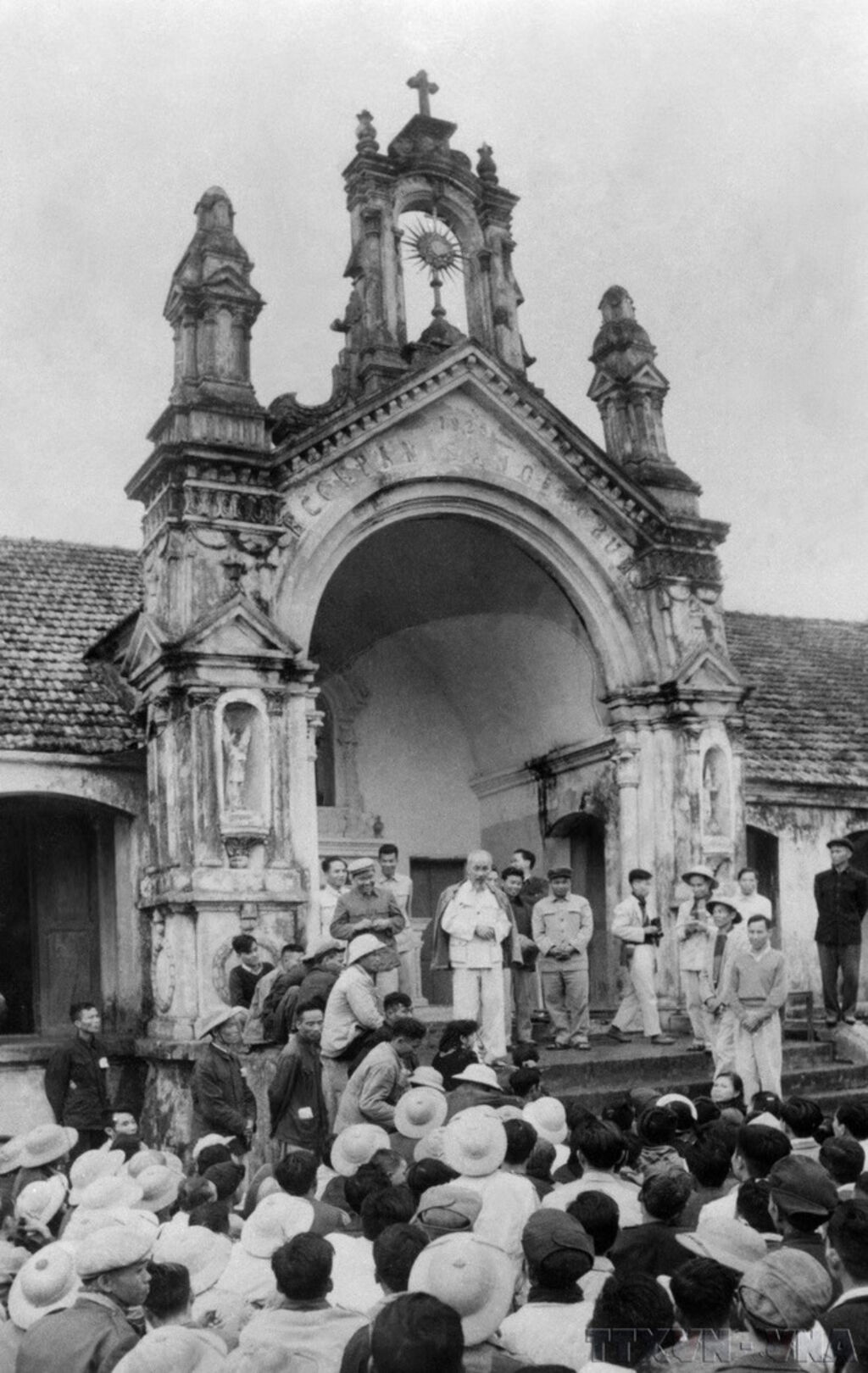 |
| President Ho Chi Minh meets with Catholic followers in Thach Bich village, Bich Hoa commune, Thanh Oai district, Ha Dong province (Hanoi today) on December 5, 1959__Photo: VNA |
Inevitable requirement of renewal
Our country is vigorously implementing the renewal policy that our Party has proposed since its 6th National Congress, with bold restructuring of the political system and a reorganization of administrative units at all levels, and the implementation of a two-tier local administration model. The goal is to streamline the apparatus, enhance the effectiveness and efficiency of state management and governance, and push for stronger decentralization and delegation of power to localities. This model not only eliminates unnecessary intermediate levels but, more importantly, reorganizes the space for sustainable development, bringing authorities closer to the people, for the people and better able to serve the public. From the central to local levels, the entire political system is taking drastic and synchronous actions with the dual goal of streamlining the organizational apparatus while enhancing the effectiveness and efficiency of management, serving the people better and continuously improving people's lives. However, streamlining the apparatus of the political system and rearranging administrative units also impacts a segment of cadres, party members, civil servants. This process requires fairness, consensus and strong political determination, and, most importantly, a willingness to set aside personal interests for the greater good. without unity from top to bottom, challenges and and inefficiencies are likely to arise in implementation. Therefore, solidarity in the entire political system is the key to the success of this reform. Close coordination between central agencies and local authorities is essential to promptly remove difficulties, while the collective support of cadres, civil servants and the people will form a stable foundation for effective implementation of the new model. Never before has the requirement of "unity from top to bottom and smooth coordination" in the apparatus of the entire political system been as critical as it is today. During the process of streamlining and reorganizing the apparatus, a lack of unity can lead to numerous challenges and risks of division.
First and foremost is the concern among officials, as mergers may result in some losing their positions or having to change their roles. Without clear and reasonable policies for those affected by the restructuring, negative sentiments can easily arise, leading to a state of “outward harmony but internal discord”, thereby undermining internal unity. In addition, localism is also a notable issue, as each individual often holds a special attachment and pride for their hometown or the place where they have been closely connected to. When localities are merged, concerns about the new name, the location of administrative headquarters, or the allocation of personnel can lead to feelings of comparison, hindering the mergence process. Moreover, differences in culture, customs, and levels of development between administrative units also pose a major challenge. The mergence of a mountainous province with a lowland province, or a “rich” province with a “poor” one, requires the leaders to be truly impartial and visionary in order to ensure a balanced distribution of resources and harmonized development interests. A lack of fairness in resource allocation can easily lead to regional disparities, undermining the national unity bloc. Meanwhile, hostile forces are always ready to exploit these difficulties to spread false information and sow division between the Party and the government, and the people. Should officials, Party members, and the populace lack vigilance, they could become susceptible to those acts of sabotage, seriously impacting the objectives of apparatus restructuring, and national stability and development. In summary, the absence of unity and consensus can derail or hinder the effective operation of the apparatus. Therefore, preserving unity must be regarded as a top priority, and the prerequisite for the successful implementation of all other reform efforts. To maintain and strengthen unity in this new development space, it is essential to synchronously implement a number of key solutions as follows:
First, it is necessary to strengthen unified leadership and direction. During the period of reorganizing the political system's apparatus, the centralized leadership role, from the central to the local levels, must be upheld and fully promoted. Party committees and authorities at all levels must ensure consistency in implementing the resolutions, conclusions, directives, and instructions of the Party Central Committee, avoiding parochialism or actions contrary to overarching regulations. At the same time, it is essential to maximize the role of the Vietnam Fatherland Front and socio-political organizations in uniting and mobilizing the people, thereby fostering widespread consensus. All guidelines and policies, from formulation to implementation, must place the interests of the people at the center, and foster close links between the Party and the people in order to ensure that the people understand, trust, agree with, and actively support the process.
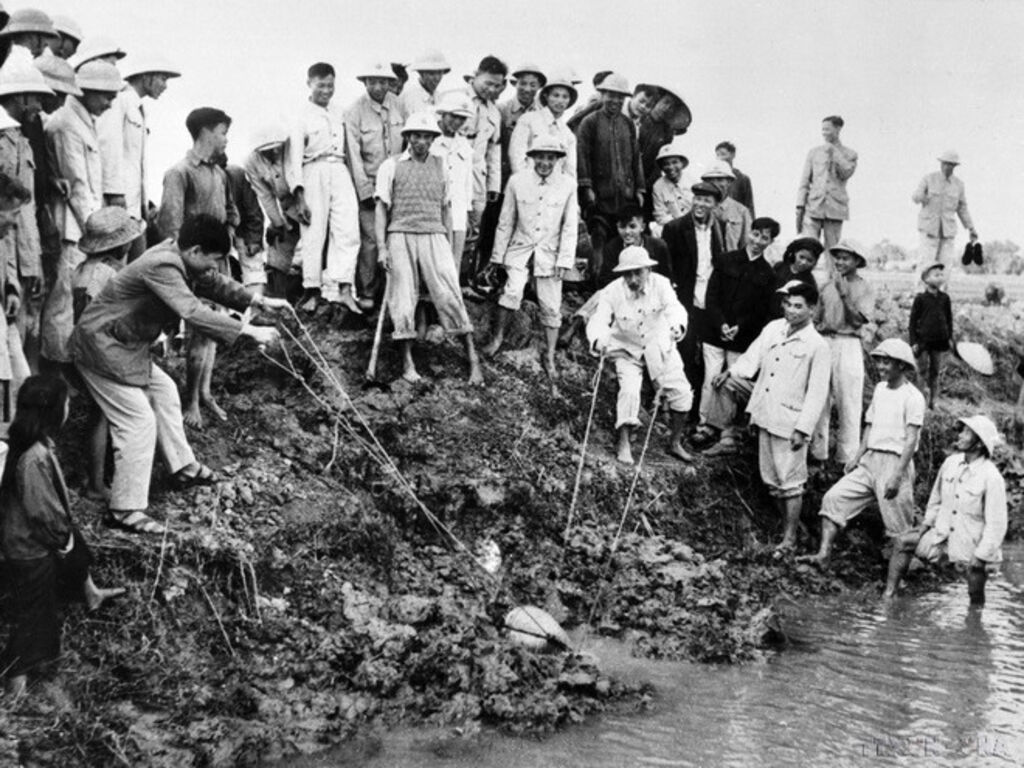 |
| President Ho Chi Minh bails water to fight drought with farmers in Dai Thanh commune, Ha Dong province (now Hanoi) on January 12, 1958__Photo: VNA |
Second, it is important to uphold the responsibility of officials and Party members in setting good examples, especially those in leadership positions. Each official and Party member must truly serve as a role model in maintaining internal unity and always place collective interests above personal ones. The process of appointing and arranging personnel following the mergers of provincial-level administrative units must be carried out in an open, transparent, and fair manner, based on clear criteria. It is necessary to resolutely address any signs of factionalism, “group interests,” or localism. At the same time, administrative discipline must be strengthened to promptly prevent and correct negative manifestations or stagnation during the transition period. In particular, individuals and organizations that willingly put aside personal interests for the common good should be regularly recognized and rewarded. This will help inspire others and spread the spirit of solidarity for shared benefits throughout the system.
Third, policies and laws should continue to be improved to harmony of interests and social justice, thereby strengthening unity during the restructuring process. It is essential to develop, issue, and implement rational and practical support policies for localities and personnel directly affected by the mergers. These may include financial assistance, allowances, rewards, encouragement, as well as social welfare programs and infrastructure investment for newly-merged localities. In addition, relevant legal regulations must be promptly reviewed, amended, and supplemented to ensure consistency, clarity, and easy implementation, while minimizing legal obstacles. Monitoring and inspection of law enforcement must also be enhanced, with violations strictly handled to uphold discipline, strengthen public trust, and build broad consensus among the people.
Fourth, communication and public awareness campaigns on the significance and benefits of the apparatus streamlining must be intensified among officials, Party members, and the general public. These efforts will help everyone understand that this is a sound and necessary policy for the country’s long-term development, and foster voluntary and united implementation. Communication work should effectively combine education on national history and traditions of unity with clear explanations of specific policies and transparent information about the merger roadmap, personnel and financial issues. At the same time, it is vital to actively counter and refute false and distorted claims by hostile forces, and to promptly address rumors that could cause social instability. Particularly, direct dialogue between leaders and the public should be promoted to resolve concerns and doubts, thereby reinforcing public trust and solidarity across society.
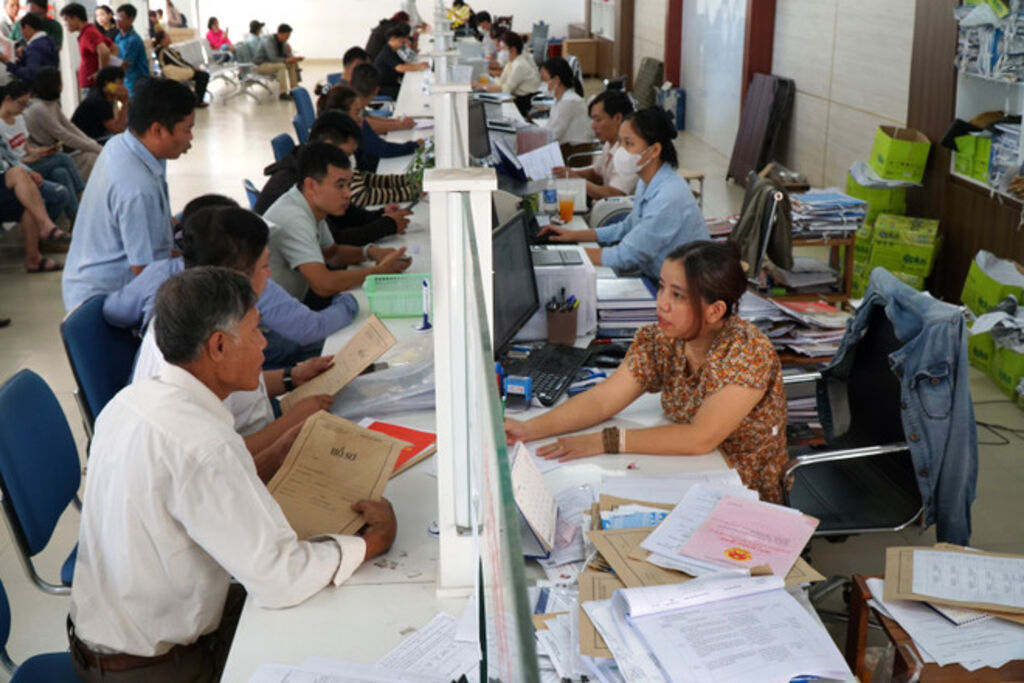 |
| People come to do procedures at the “one-stop shop” of the People’s Committee of Hoa Vang district, Da Nang city__Photo: VNA |
Fifth, it is essential to strongly promote the “Party character” and political mettle within every Party organization and among all Party members. Every cadre and Party member must remain steadfast in placing the interests of the nation and the Party above all else, strictly adhering to the principles of democratic centralism and Party discipline. Internal opinion differences must be addressed through democratic, frank and constructive discussions. Once consensus is reached, unity must be maintained and decisions rigorously implemented, with no tolerance for factionalism, localism, or actions that undermine internal solidarity. Leaders of Party organizations must serve as the nucleus of unity and as role models in harmoniously resolving emerging contradictions, while remaining highly vigilant and resolutely fight against all plots of division and sabotage by hostile forces. Only when there is unity in both thought and action—top-down and inside-out, can the solidarity in the entire Party and people become truly firm, forming the strength needed to successfully restructure the apparatus and usher the country into a new phase of development.
Solidarity has always been and will forever remain the invincible strength of the Vietnamese revolution. In the current challenging phase of apparatus reorganisation, this spirit must be deeply embraced and strongly upheld. History has entrusted us with the crucial task of building a streamlined, effective, and efficient apparatus that meets the demands of rapid and sustainable national development in the new era. To accomplish this mission, there is no “weapon” more powerful and effective than the consensus and unity of the entire political system and the wholehearted support of the people. As President Ho Chi Minh once said: “Unity, unity, great unity – Success, success, great success!”
Under the Party’s wise leadership, with collective mettle and intelligence, and the tradition of firm great national unity, the effort to streamline the political system’s apparatus, reorganize administrative units, and operate the two-tier local administration model will undoubtedly achieve positive results, laying a solid foundation for the country to enter a new stage of development as envisioned by the Resolution of the 13th National Party Congress. Once again, the strength of solidarity will enable us to overcome all obstacles, turn challenges into opportunities, and firmly advance the nation into a new era—that of prosperity, integration, and sustainable development for a better and happier life for the people.- (VNA/VLLF)









